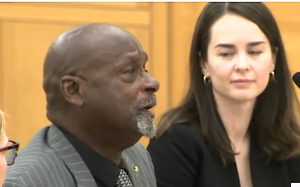Introduction
Leonard Mack, a man who served seven years in prison for a crime he did not commit, was finally exonerated in a Westchester County courtroom after new DNA evidence proved his innocence. The case, which dates back to 1976, marks the longest wrongful conviction ever vacated through DNA evidence. The day of Mack’s exoneration was not only a significant legal victory but also a deeply emotional one, as it fell on his 72nd birthday.

The Crime and Arrest
In 1975, two teenage girls were walking home from school in Greenburgh, a wooded area of New York, when they were attacked by a man who followed them. The assailant bound the girls, and though one of them managed to flee, the incident left a lasting impact. In the aftermath of the crime, authorities were under pressure to find the perpetrator. Leonard Mack, who was 23 years old at the time, was arrested and later convicted for the crime. The conviction was based largely on a vague description provided by the victims—a black man wearing a hat.
Mack’s arrest and subsequent conviction were questionable from the start. Despite the fact that Mack had been seen by three witnesses on the day of the crime, all of whom could place him far from the crime scene, these critical testimonies were overlooked. Instead, the focus remained on the weak evidence that loosely connected him to the crime. This flawed investigation led to Mack being sentenced to prison, where he served seven years in the notorious Sing Sing Correctional Facility.
The Long Fight for Justice
After serving his sentence, Mack moved to South Carolina in an attempt to rebuild his life. However, the wrongful conviction continued to haunt him for decades. The stigma of being a convicted rapist affected numerous aspects of his life, from employment opportunities to social relationships. Despite having served his time, the conviction cast a long shadow over his life, preventing him from moving on from a crime he did not commit.
Mack’s case caught the attention of the Innocence Project, an organization dedicated to exonerating wrongfully convicted individuals through the use of DNA evidence. The organization’s lawyers took up Mack’s case, determined to prove his innocence and clear his name. They argued that the original investigation and trial were riddled with errors and that new DNA testing could definitively prove that Mack was not the perpetrator.
The Exoneration
In a dramatic turn of events, new DNA evidence emerged that conclusively proved Leonard Mack’s innocence. The evidence, which was unavailable at the time of his original trial, showed that the DNA found at the crime scene did not match Mack’s. This new evidence was presented in court, leading to the vacating of his conviction. The courtroom was filled with emotion as Mack’s wrongful conviction, which had hung over him for nearly five decades, was finally overturned.
Westchester County prosecutor expressed deep remorse for the wrongful conviction, acknowledging the grave injustice that had been done. The prosecutor apologized to Mack in court, recognizing the pain and suffering he had endured due to the faulty conviction. In a touching moment, the judge who presided over the exoneration hearing asked Mack for a hug, symbolizing the court’s recognition of the immense wrong that had been righted.
A Bittersweet Victory
The exoneration of Leonard Mack is a poignant reminder of the flaws in the criminal justice system and the devastating impact of wrongful convictions. For Mack, the day of his exoneration was bittersweet. It came on his 72nd birthday, a day that should have been filled with joy but was instead marked by the release of nearly 50 years of pent-up emotion. As he walked out of the Westchester County Court, the tears of sorrow and frustration that had been repressed for decades were finally replaced by tears of relief and joy.
Mack’s exoneration not only clears his name but also sets a precedent for other cases where wrongful convictions may have occurred. His story highlights the importance of organizations like the Innocence Project and the need for continual advancements in forensic science to prevent such injustices from happening in the future.
Conclusion
Leonard Mack’s case stands as a testament to the enduring power of truth and the relentless pursuit of justice. After nearly five decades of living under the weight of a wrongful conviction, Mack is finally a free man, his name cleared, and his dignity restored. The exoneration, while a victory, also serves as a sobering reminder of the deep flaws that can exist within the criminal justice system, and the long road that many like Mack must travel to see their innocence recognized.

















